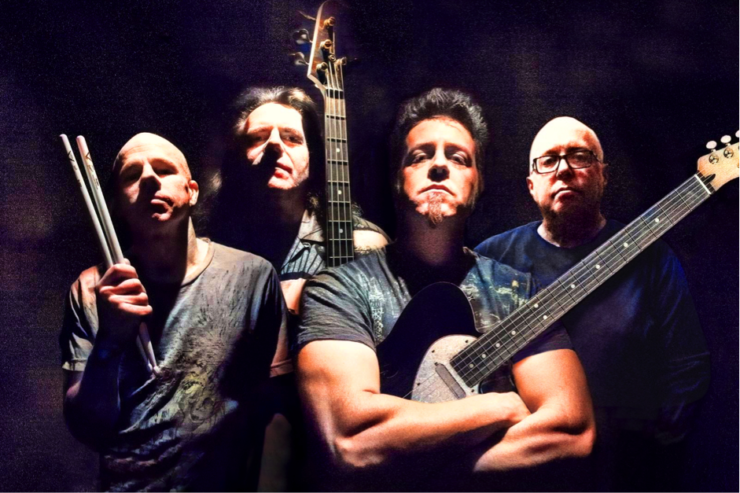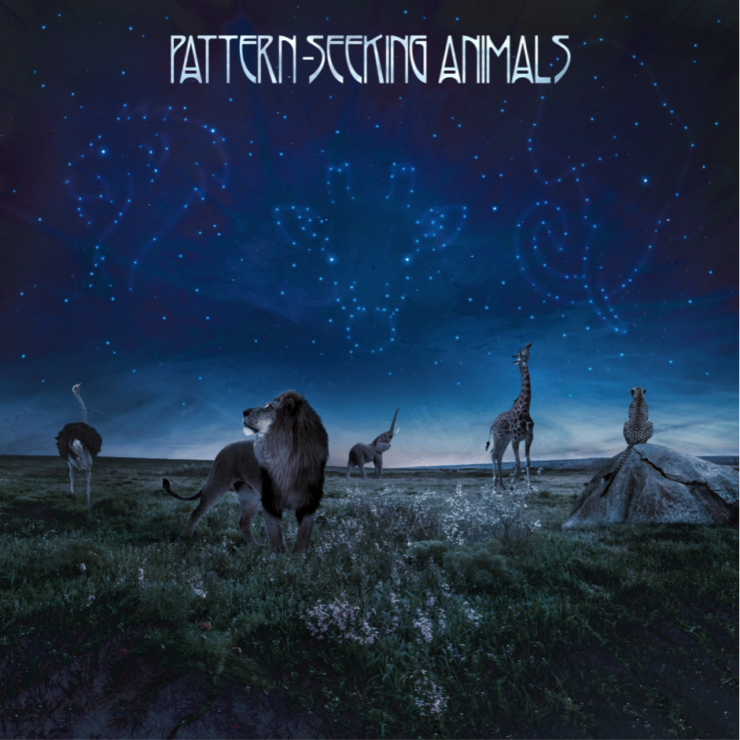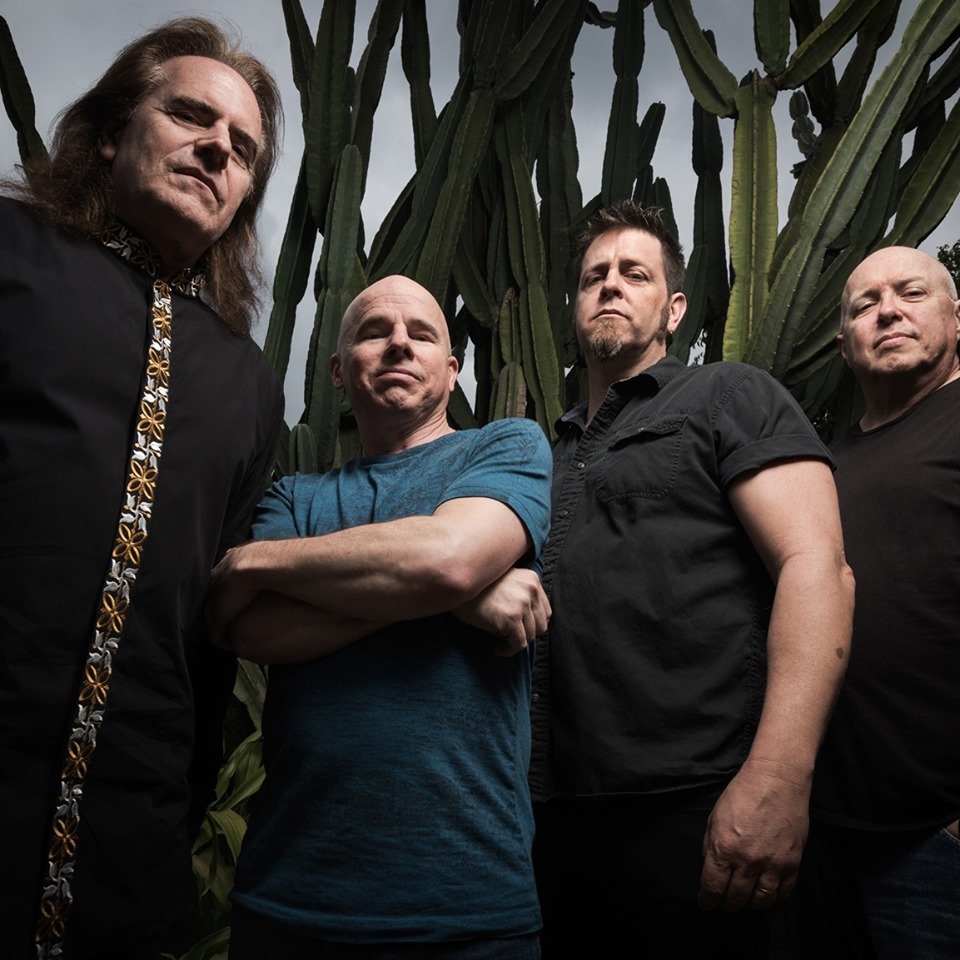Let’s get one thing clear: Although the new band Pattern-Seeking Animals shares a majority of recent members of the group Spock’s Beard, this is not really a Spock’s Beard project. Instead, this is an opportunity for SB producer and songwriter John Boegehold to stretch his own creative and performance muscles.
That said, his access to top-notch players does bring about band overlap. Longtime SB bassist Dave Meros, former SB drummer Jimmy Keegan, and SB vocalist Ted Leonard (who also provides vocals for the group Enchant), are present and accounted for.
Yet, in this conversation with Boegehold and Meros, it is certain that there were new parameters they intended for Pattern-Seeking Animals, and these were critically different from what Spock’s Beard does. The debut record is set for release on July 5, no doubt bringing some fireworks of their own.
Because there is so much about the Spock’s Beard history that informs the formation of Pattern-Seeking Animals, we readily admit there is more of it present than expected. However, this new band promises to deliver and will surely have more of their own history to speak of in the months and years to come.

MusicTAP: John came in as Neal (Morse) was leaving to pursue his solo career. Up until that time, Spock’s Beard was very much a closed shop. Dave, what was it like coming into this new writing and recording dynamic after having worked a specific way for many years?
Dave Meros: From my point of view, it certainly made me step up my game and start writing. I realized that each band member would have to get serious about contributing material to the band or we’d fail, and that was kind of exciting. John and I had written a bunch of songs together in the late ’80s into the very early ’90s but after that, I started touring with various bands and lost interest in writing. I don’t think I wrote a single piece of a song between maybe 1991 and 2003, but this was a call to arms. I had never written anything that would be considered progressive either, but I had 10 years of listening to and learning from Neal’s songs and got a little insight into how he put a song together, which was a big help.
MusicTAP: Neal’s songs have, for lack of a better descriptor, a specific “Neal-ness” to them, which he clearly has continued with. In the second iteration of the band, working with John behind the scenes and with drummer Nick D’Virgilio as frontman, what did you need to change about your process, if you had to change, to begin with?
DM: Oh, I had to basically start from zero, having never written progressive rock in my life, compounded by the fact that I hadn’t written anything at all in 12 years. Fortunately, John and I had a history of writing together, so that was something that boosted my confidence a little.
I also had to join the modern world as far as technology goes. The last thing that I had written in 1991 was done on a 4-track cassette recorder, and by 2003 the world was well into the modern era of digital audio recording. It took me a while before I got that together, and the first batch of ideas that I came up with – and John can testify to this because he was the poor soul on the receiving end of these things – were me playing either bass or piano into a handheld cassette recorder, transferring that into my computer using the most basic Windows audio recording feature and then managing to convert to MP3 to send to John.
After that first album without Neal (2003’s Feel Euphoria), I knew I really needed to step up my game, so I installed Cubase on my computer and started learning that, completely by trial and error. I’ve gone back and checked out that first couple of projects that I did on Cubase…the way I recorded things back then was quite funny, actually. In fact, looking at how I did it, I am amazed that it even worked.

MusicTAP: Similarly, there seemed to be an unspoken mandate that while there needed to be a bit of continuity between the first and second iterations, Spock’s Beard seemed more intent on focusing on contained, structured songs over songs that spanned album sides or entire concept records. Had there been a conversation about moving away from that, or did it happen naturally?
John Boegehold: I seem to remember the only mandate was to get an album out as soon as possible to let people know the band wasn’t doomed. I don’t think anyone made a conscious decision to write more contained, structured songs, at least I didn’t. That’s just the way I tend to write anyway.
MusicTAP: It seemed like once everyone locked into this new SB, it was time to change again, with Nick leaving. That brought in Ted Leonard on vocals and Jimmy Keegan on drums. (Editor: Keegan became the Spock’s Beard touring drummer when D’Virgilio moved out front.)
I’d been a huge fan of Ted’s albums with Enchant. What caused you to go with him, or him with you?

JB: That’s more of a Dave question. I never had any say in personnel matters in SB but I’m definitely glad they went with Ted.
DM: Spock’s Beard did a Europe tour with Enchant in 1999 and we had a blast with those guys, and of course got a chance to hear Ted sing every night. We did another tour with Enchant a few years later (a triple bill, with Spock’s, Enchant, and California Guitar Trio) and that solidified the friendship. Right around the time that Nick left the band, Ted had moved to the Sacramento area and coincidentally so had I. Ted had started a cover band, asked me to join, and so we had reconnected that way and were playing together quite a bit. When it was time to find a replacement for Nick there was really no discussion about it. The Spock’s Beard conversation went pretty much like this: “Well, we have to find a new singer. Want me to call Ted?”
Answer: “Yeah, that would be great.”
MusicTAP: When you are working with players who are now “the new guys,” such as Ted and Jimmy were (but in this instance speaking about Ted), you also have to take into account the frontman status. While the lyrical shift from Neal to what Nick sang of opened up new opportunities, Nick still had a considerable history with SB. With Ted, you had a bit more of a blank slate in terms of what you could do, but you also had someone with a stunning vocal range. How did the two of you “lock” and work together initially?
JB: History is never a factor for me. Whoever was in the band at the moment was all that mattered. It wasn’t too difficult for me to lock with Ted since I was already familiar with his vocal ability. Just a bit of trial-and-error to find out what the highest and lowest notes were in his range and writing melodies that he could dig in to.
MusicTAP: Not that the rhythm section wasn’t active prior to Brief Nocturnes and Dreamless Sleep (and you have been one of the main writers for several SB tracks), but there was a renewed emphasis on the groove. I’m thinking of “Submerged” and “I Know Your Secret.” You worked even longer with Nick in that rhythm role than him as frontman. What was it like moving on with Jimmy?
DM: Jimmy fit into the situation immediately and seamlessly, and we both seem to appreciate a lot of the same things in music, and we have a similar feel for the way we like bass and drums to work together. But going back to that time right after Neal left and Nick wanted to become the frontman, I was actually against it because I didn’t want anybody else behind the drums when we did live shows. I think the whole band felt that way, but Nick REALLY wanted to give it a shot, so we gave it a chance. Nick brought Jimmy in, and after playing with him for the first time we simply weren’t worried anymore. I remember thinking “Well, that was easy.” Ha! I’ve definitely been blessed with the drummers that I’ve had the privilege with which to work in my life.

MusicTAP: On The Oblivion Particle, Jimmy had an opportunity to really prove himself also as a vocalist on “Bennett Built A Time Machine.” Because of the deep vocal requirements of the back catalog, was vocal ability always a “must” for filling that role?
JB: I thought Jimmy was perfect for “Bennett” and was great being there for vocal blends with Ted in the Studio for Brief Nocturnes and Dreamless Sleep and The Oblivion Particle.
DM: Yes, definitely. And after Jimmy left Spock’s Beard we were faced with the unfortunate reality that a drummer that can play as well as Jimmy and sing high vocal harmonies is a rare creature. (I will take this opportunity to give a big shout-out to Mike Thorne, SAGA’s drummer, who stepped in for our last Cruise to The Edge and Europe tour and did an awesome job.)
MusicTAP: Now we’re all caught up. Jimmy left SB as the drummer. Nick came back for Noise Floor, but we have the new group, Pattern-Seeking Animals. From all I’ve heard, this is most certainly not Oblivion Particle Part 2…but how might you both describe this new project?
JB: Understandably, people will want to compare us to SB but I approached writing and producing the album a lot differently. As far as how to describe it, I always find it difficult to describe my own music. Art rock? Epic pop? Melodic prog? Symphonic wanking? I’m open to whatever listeners want to call it.
DM: I hope I’m not alienating people when I say this, but to me, Pattern-Seeking Animals is a breath of fresh air in the prog scene. I’ve always been a huge fan of strong melody, musical hooks, and listen-ability, and that’s what PSA is all about. There is still the long format songwriting, the odd time signatures and all that, but it’s never technique “because we can,” or complexity for complexity’s sake. Everything is in service of the song, and I appreciate that immensely.
MusicTAP: John, this is purportedly your baby, with you being the primary driver of its creation. First off, why did you feel compelled to go in this direction versus bringing that to SB? What freedom does having the new group afford your writing that you wouldn’t have been able to have with SB?
JB: A few reasons. Since I started writing with Spock’s Beard, I think they averaged an album every 2-1/2 to 3 years. That worked well for them but since I write all the time, I’d find myself with an hour’s worth of material a year or two before they’d even start talking about recording again. I constantly had a backlog of finished and in-progress songs and that was before the band members brought in their own material which mine had to compete with for album space. At some point, I decided – for better or worse – that I’d be a lot happier if I was the one calling the shots regarding what does and doesn’t end up on an album and how it’s produced. The only way that was going to happen was if I started a project on my own terms. As far as freedom goes with Pattern-Seeking Animals, it’s a clean slate on all levels which is incredibly inspirational.
MusicTAP: This is an interesting position to be in. You have both the familiarity of people you’ve worked with for many years but at the same time an entirely different canvas from before. What has been the effect of all this on the writing and recording of this material?
DM: It’s been very low stress, very musically satisfying, and very comfortable, and I might add, something that I’m genuinely kind of excited about. I really love the material, and I’m very happy to go back to a situation where one person has the vision for the band and has the final word on major decisions. My one concern is that people will (and already are) calling this a Spock’s Beard offshoot, which is not the intention. It’s meant to be a separate vehicle to explore material that wouldn’t necessarily fit into the framework of Spock’s Beard.
In fact, the two PSA songs that I have co-writing credit with John on were both rejected by Spock’s Beard, so PSA gives them a chance to see the light of day.
MusicTAP: What’s the band name about?
JB: I’d heard the phrase Pattern-Seeking Animals a few years back and liked the way that it sounded, even though at the time I had no idea what it meant. It suggests humans tend to find existing patterns in life and nature to learn and evolve as well as finding patterns where they don’t exist. Seeing the shapes of animals in clouds and stars or the face of Jesus in the syrup on a pancake, etc.
DM: As far as the band name “Pattern Seeking Animals,” I’d just add that music itself is one of those things that is comprised of patterns. I’ve read some articles about the basic function of music and why it has existed everywhere on Earth throughout history. Living things have survived by following cues provided by their senses, and things like visual and auditory patterns not only help us to survive, but in the higher species like humans, the patterns in art and music make us feel safer, and that our environment is more predictable and controllable. How’s that for a nerdy answer? Haha!
MusicTAP: Going out with this new entity after having just completed it, it might be too close to have specific moments to point to…but are there instances for you both – on a song or even a moment of a song – where you felt things fall into place and you could say, “This is the reason why we have put this new entity together”?
JB: I have a couple. The first was recording the basic drums tracks with Jimmy in the studio, especially on the song “We Write the Ghost Stories,” which was a hell of a lot of fun with him coming up with parts and drum sounds. Another was in the song “Orphans of the Universe” which was one of the first we recorded. When I dropped Ted’s guitar tracks into the mix and they fit so perfectly I knew everything was going to fall into place quite nicely.
DM: I think the whole thing kind of evolved organically without any initial plan. From my perspective, John just wanted to record some material that he’d been working on, some of which was left over from Spock’s Beard sessions, and some new ideas and that was the only initial goal. One thing led to another and here we are.
MusicTAP: I’m sure the longtime SB fans will flock to Pattern-Seeking Animals, but the inevitable question will be: what will this mean for Spock’s Beard?
DM: It’s a separate project and wouldn’t affect anything that Spock’s Beard might want to do. Everybody and their uncle are doing side projects these days, so it’s not like some treasonous act, it’s commonplace.
MusicTAP: Likewise, are you looking to Pattern-Seeking Animals as an ongoing band, and what plans do you have for the future?
JB: (This is) ongoing. We’re starting to field some offers for live shows which will hopefully come together in the near future. As far as recording goes, I immediately started writing new material for album #2 when we finished mixing the first one. Most of the new songs have been written and recently we recorded drums for them. Hopefully, it’ll be released sometime in early 2020. After that, I start writing for #3 and will keep writing at least one album a year as long as people are interested.
DM: This stuff would be absolutely great in a live situation.
MusicTAP thanks John Boegehold and Dave Meros for taking the time to speak with us. More information about Pattern-Seeking Animals can be found at: https://www.facebook.com/psanimals1